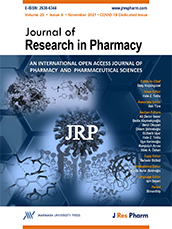Editor-in-Chief
Hatice Kübra Elçioğlu
Vice Editors
Levent Kabasakal
Esra Tatar
Online ISSN
2630-6344
Publisher
Marmara University
Frequency
Bimonthly (Six issues / year)
Abbreviation
J.Res.Pharm.
Former Name
Marmara Pharmaceutical Journal
Journal of Research in Pharmacy
2021 , Vol 25 , Issue 6
A recent update of anticoagulant therapy on severe COVID-19 patients
1Division of Drug Delivery and Disposition, Department of Pharmaceutics and Pharmaceutical Technology, Faculty of Pharmacy, Universitas Padjadjaran, Bandung, Indonesia2Department of Cardiology and Vascular Medicine, Faculty of Medicine, Universitas Padjadjaran, Bandung, Indonesia
3Department of Clinical Pharmacology, Gunma University Graduate School of Medicine, Maebashi, Gunma, Japan
4Department of Pharmacology and Clinical Pharmacy, Faculty of Pharmacy, Universitas Padjadjaran, Bandung, Indonesia DOI : 10.29228/jrp.71 This paper aims to discuss how blood coagulation causes thromboembolic manifestations, including deep vein thrombosis (DVT), pulmonary embolism (PE), and other venous thrombosis events (VTE) and the possible mechanism and the effectiveness of using anticoagulant drugs in severely ill COVID-19 patients. This review is based on literature search through electronic databases of PubMed, UpToDate, Medline, Embase, International Pharmaceutical Abstract (IPA) and clinicaltrials.gov from December 2019 (since covid-19 emergence) to end of 2020. This review used keywords combination related to the association between covid-19 and blood coagulation (DVT, PE and other VTE), as well as clinical trials of anticoagulant drugs for the treatment of covid-19 patients. We summarized that thromboembolism incidence in severely symptomatic (ICU) patients ranges from 16.7 to 85 %. Furthermore, the main D-Dimer parameter had a significant difference between VTE (non-survival) and non-VTE (survival) patients. Meanwhile, the possible mechanism is the increased levels of complement and cascade components, including C1R, C1QC, C3b/C4b receptor 1 (CR1), C3, coagulation factors II, V, IX, and X, as well as reactive antiphospholipid antibodies affecting hypercoagulability, platelet activation, aggregation, and adhesion. Studies have shown the existence of thrombosis events in severe COVID-19 patients as well as the effectiveness of anticoagulants therapy in early prognosis, but the results of phase 3 clinical trials are still under investigation at several centers. Keywords : Anticoagulant; COVID-19; heparin; SARS-CoV-2; thromboembolism

